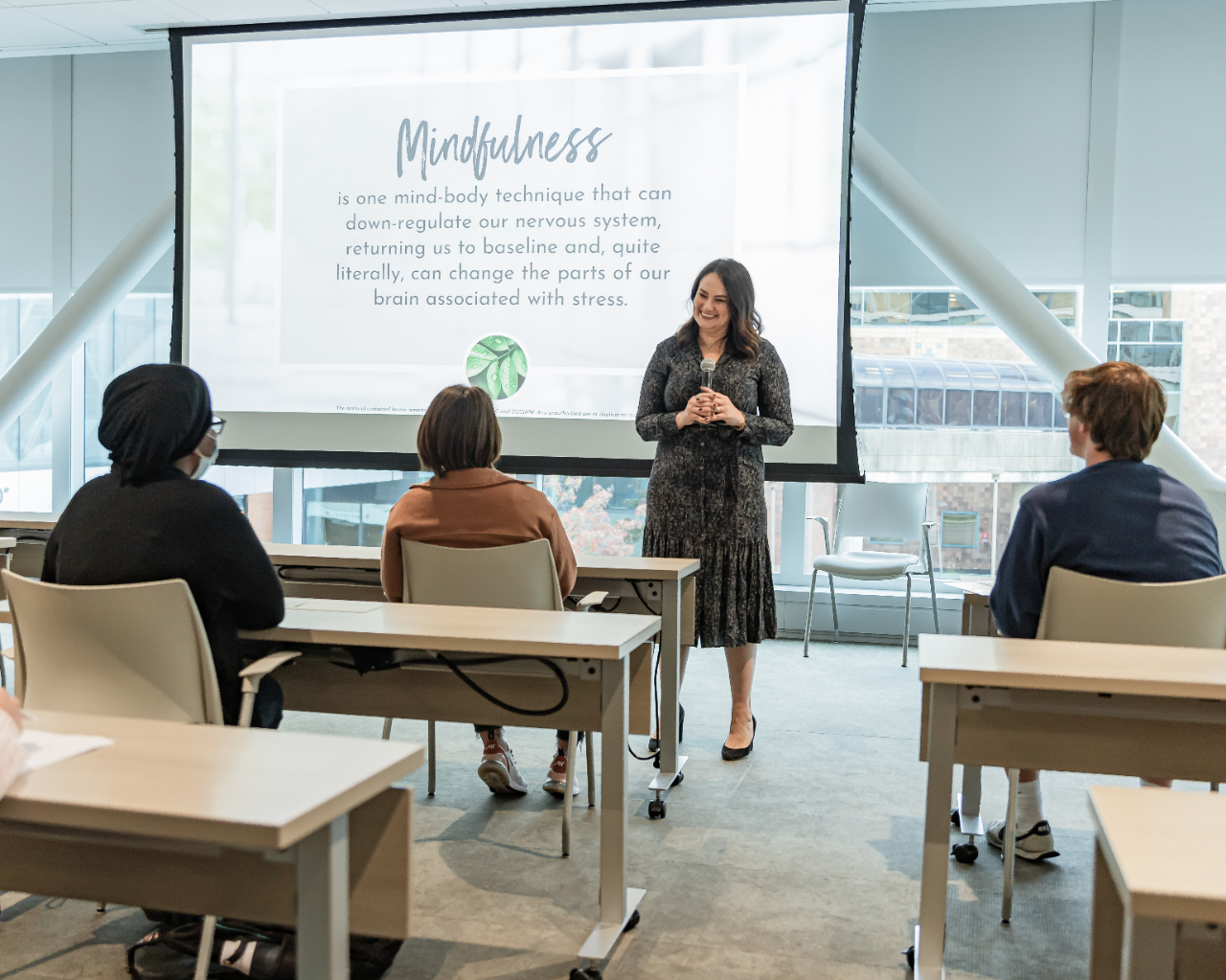
Six micro mindful moments you can implement today for big change over time
The benefits of a regular mindfulness practice include decreased stress and better overall wellbeing
Stress is at an all-time high
It has been estimated that 75-90% of all visits to primary care physicians are for stress-related problems, according to the American Institute of Stress. According to a 2022 report, an estimated 1 million workers are absent every day because of stress and US businesses lose $300 billion each year as a result of workplace stress, while 27% of U.S. adults say they are so stressed they can’t function.
Stress is wreaking havoc on us as individuals and as organizations. When we have unmanaged, prolonged, and severe stress, it impacts us negatively and it actually changes our brain.
Meriden McGraw, MS, MPH Director of Workplace Mindfulness, Osher Center for Integrative Health at UC
According to Meriden McGraw, MS, MPH, director of Workplace Mindfulness for the Osher Center for Integrative Health at the University of Cincinnati, "Stress is wreaking havoc on us as individuals and as organizations. When we have unmanaged, prolonged and severe stress, it impacts us negatively and it actually changes our brain." She continues, "All stress isn’t bad. In fact, we need a healthy stress level to function, but we must disconnect and learn ways, like mindfulness, to return our bodies to baseline after a stressor occurs.”
Mindfulness can help you manage stress

Photo/Colleen Kelley Photography
According to Jon Kabat-Zinn, PHD, founder of mindfulness-based stress reduction, mindfulness is the awareness that arises through paying attention in a particular way, on purpose, in the present moment, non-judgmentally to the unfolding of experience moment to moment. Mindfulness is a skill that can be developed through practice and repetition.
Mindfulness is a powerful tool that can be used to down-regulate the nervous system and help us cope with stress in a healthier manner. People who practice mindfulness have less anxiety and depression and an overall better quality of life.
Sian Cotton, PhD Director, Osher Center for Integrative Health at UC
The benefits of a regular mindfulness practice may include decreased stress and anxiety, increased focus and concentration, and improved sleep, communication, relationships, and physical well-being. Practicing mindfulness can build new neural pathways in the brain that increase attention skills, affecting the prefrontal cortex, the seat of attention which is responsible for executive function and working memory.
According to Sian Cotton, PhD, Director of the Osher Center for Integrative Health at the University of Cincinnati, "Mindfulness is a powerful tool that can be used to down-regulate the nervous system and help us cope with stress in a healthier manner. People who practice mindfulness have less anxiety and depression and an overall better quality of life."
These benefits can come from brief practices integrated into your day, but habitual practice is key for sustaining improvements.
Six micro mindful moments you can implement today

Photo/Teah Longland Photography
- Practice mindfulness before you get out of bed. Sit on the edge of your bed, feet flat on the floor; feel each part of your body connecting with a surface; pay attention to your breath; notice how your body feels in this moment; set an intention for the day.
- Eat your breakfast, lunch, or dinner without doing anything else. Mindful eating transforms eating into a brain training activity and can calm the nervous system. Try eating one meal without music, TV, or your phone. Let your mind notice and observe what happens when you simply eat. Click here for our Mindful Eating guide.
- Do one thing at a time (stop multi-tasking). Switching between tasks (for example, quickly checking your email while with your family) leaves an attention residue that can impact your brain for 15-30 minutes. When you can, try to focus on one thing and retrain your brain to single-task instead of multi-task.
- Turn off the TV. How often are you doing something with the TV on in the background? This “TV as background noise” habit is bad for our focus because our attention is continuously drawn back to the screen, rewiring the brain to be distracted. If you are not watching the TV, turn it off. If you are watching TV, just watch TV.
- Unclench your jaw. When we clench our jaw, our mind is usually tense as well; thinking about a worst-case scenario, trying to solve a seemingly impossible problem, worrying, or over-analyzing. Throughout your day, notice if you are clenching your jaw. Take a few breaths and release. Notice what happens in the body and mind.
- Try a sample practice from the Osher Center for Integrative Health.
Make Mindfulness a Habit: Register for Practical Tools for Starting a Mindfulness Practice 5-Week Series
This five-week virtual mindfulness series led by Meriden McGraw, MS, MPH, will help you understand how to incorporate mindfulness practice as a consistent habit in a way that is right for you. The series will run February 27-March 26, 2024 with virtual weekly meetings on Tuesdays from 7-8 p.m. as well as daily emails with resources and guided audio practices.
Featured photo at top of mindful person in nature. Photo/Getty Images/Canva.
Tags
Related Stories
Training Industry: From burned out to Zen-ed out, mindfulness training for remote workers
May 12, 2021
Meriden McGraw, director of the UC Center for Integrative Health and Wellness’ workplace mindfulness team at the UC College of Medicine spoke with the online publication Training Industry about the importance of mindfulness in keeping remote workers healthy in the midst of the coronavirus pandemic.
Local 12: Music creation's impact on the brain after cancer
August 4, 2021
UC researchers launched a new study looking treating a common brain problem that results after therapy for cancer.
Center for Integrative Health and Wellness expanding educational offerings
March 29, 2021
The UC Center for Integrative Health and Wellness has received approval from the university to begin offering a minor in integrative health
